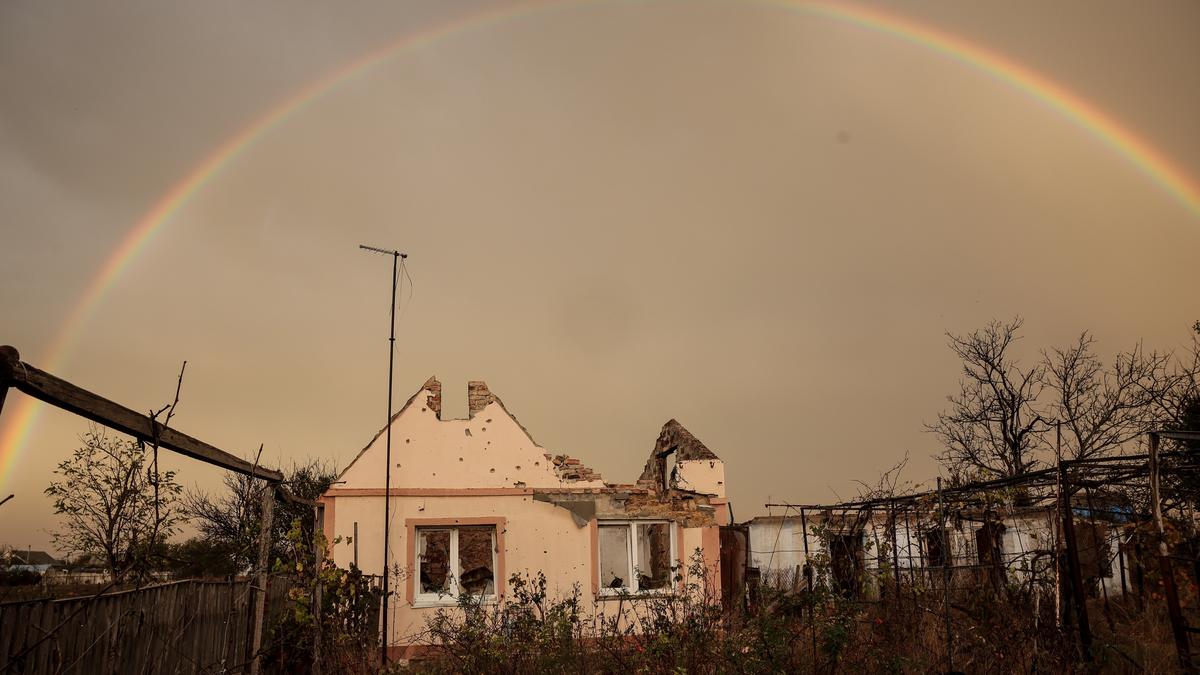Since Russia invaded Ukraine in February 2022, feelings of fear and helplessness have prevented many Russians from getting involved in active resistance without first leaving the country. While some have dedicated themselves to supporting refugees who have fled, Lida decided to get involved in the evacuations themselves.
A Muscovite who has been volunteering since she was at school, Lida had nevertheless never previously been in a combat zone. Now, aged just 22, she regularly travels to the combat zone to help evacuate those who are unable to leave on their own, coming under fire and suffering injuries on more than one occasion as a result.
Making a difference
When Lida was awoken by her mother on the morning of 24 February 2022 and told that war had broken out, it marked the beginning of two months of depression. Dumbfounded by what she saw going on around her, she had no idea what she could do.
“Many of my friends had already been arrested and I’d also been arrested myself. So, as a compromise, I opted to help save people.”
“My mother and I had very different ideas, but she convinced me that I could be more useful if I stayed out of prison. Many of my friends had already been arrested and I’d also been arrested myself. So, as a compromise, I opted to help save people.”
When, during the first weeks of the war, Lida heard that wounded children were being brought into Ukrainian hospitals, she was inspired to set up a Telegram channel for people unable to leave combat zones by themselves to ask for help being evacuated.
“The children came from Mariupol and Izyum,” Lida recalls. “They were wounded, some had to have limbs amputated. I realised that there was no assistance on the ground in the occupied territories and decided to go there myself.”
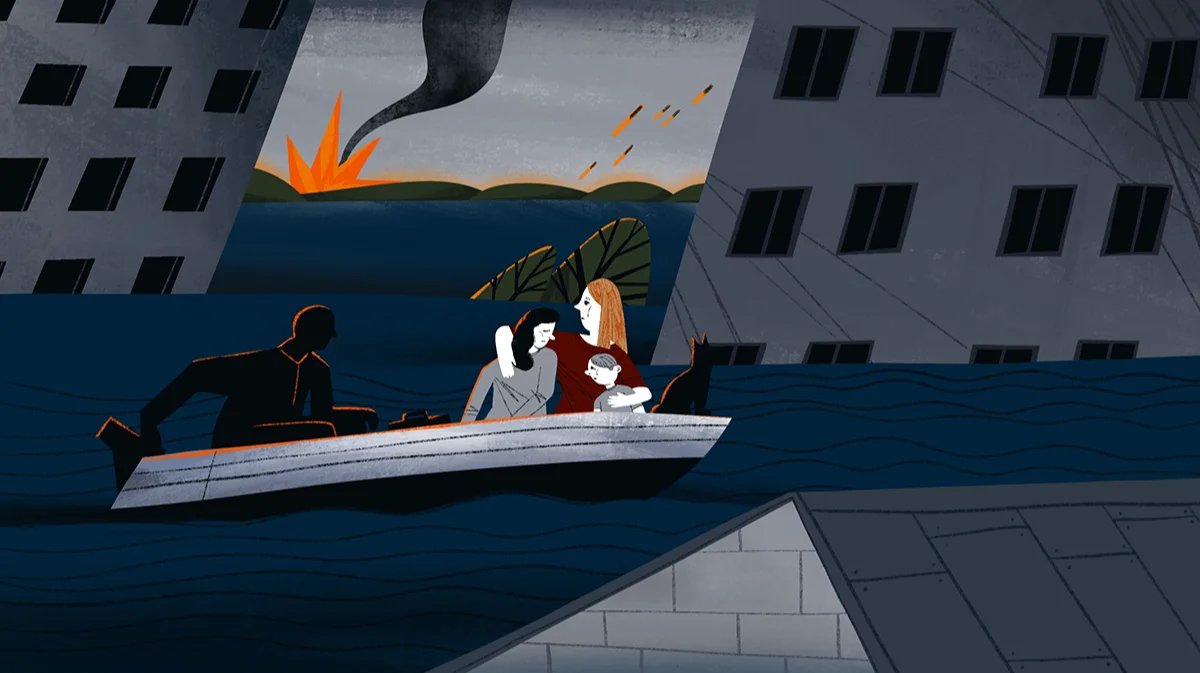
Illustration: Nastya Pokotinska / Novaya Gazeta Europe
In December 2022, Lida travelled as part of a group of Russian volunteers to Mariupol to deliver 25 tonnes of aid. As the war-torn city remained accessible from Russia following its fall to the Russian military, Lida began making regular trips to deliver aid.
In the summer, after Russian forces blew up the Kakhovka Dam on the River Dnipro, Lida travelled alone by bus to the flooded area, having made friends with “some local church-goers who were evacuating people on boats” and deciding to accompany them.
Though she had read accounts online of Russian volunteers not being allowed through, Lida said she was not stopped herself, though she was immediately confronted by a catastrophic shortage of volunteers in the affected areas once she arrived.
A surly old man and a horse
Along with several local parishioners, Lida began evacuating people, periodically meeting up with other volunteers and sharing updates on the situation at the sole house in the neighbourhood to have escaped the rising water levels. Lida would go on to work with one of the parishioners, Mikhail*, who was also there with his friends helping people to evacuate.
Describing Mikhail as “gruff” and “old enough to be my father”, Lida admits that when they first spoke, she thought he was talking down to her. “But when he saw I was resourceful and organised, he started asking what we needed to do and where we were going.”
Lida and Mikhail began working together as a team, evacuating over 60 people from flooded areas. Then they began evacuating people who couldn’t leave combat zones. They now have over 120 evacuations to their name.
Lida recalls one of her most recent trips into the combat zone. In February, somebody contacted her Telegram channel asking for help to evacuate a mother and her two-year-old daughter from the front line village of Kozachi Laheri, in the Russian-occupied part of the Kherson region.
However, upon her arrival, the 24-year-old mother in question refused to leave her home without her horse, saying it was a member of the family and that she had nursed it back to health after it had been wounded, but that she had been unable to get it to a safe place without help.
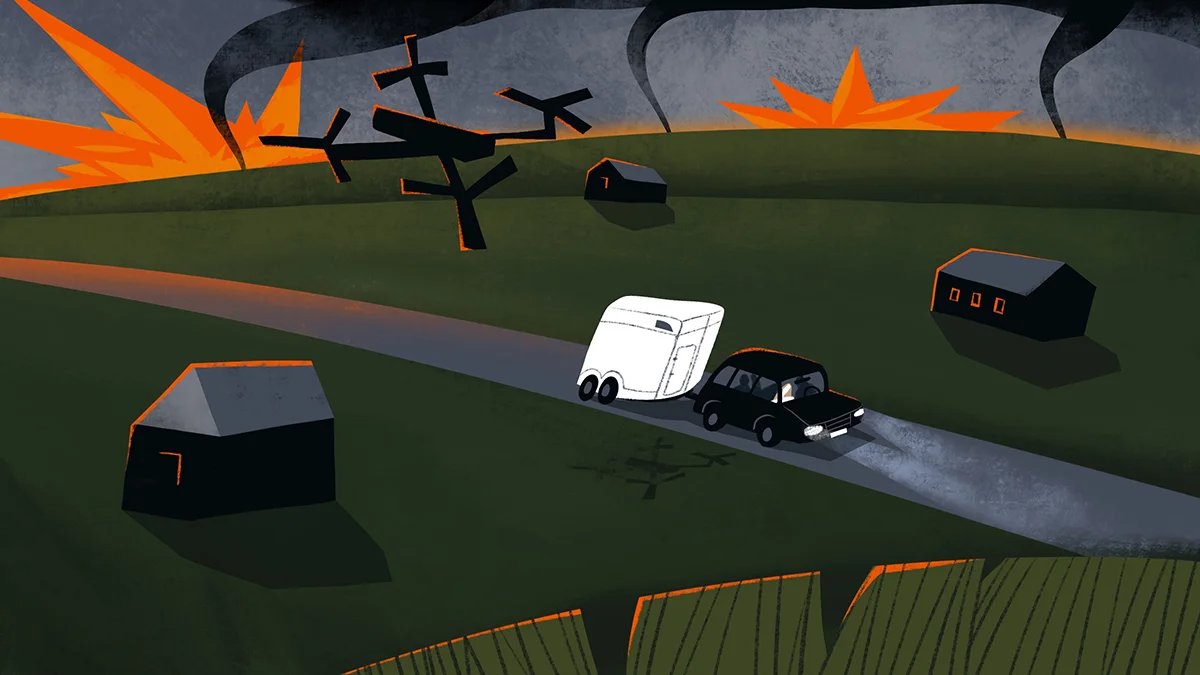
Illustration: Nastya Pokotinska / Novaya Gazeta Europe
After much hard work, Lida and Mikhail located a horsebox they could use, though driving through a war zone in something so unusual immediately made them a target.
“When we arrived at the evacuation site, we were asked ‘Are you out of your fucking minds?! We were pretty sure you weren’t coming. Who comes to a place like this with a trailer?!’”
After a long and challenging journey, the four of them managed to get the horse to Crimea. “We barely got out alive. There was a lot of shelling, and mortars, and drones. But we made it. We got them out,” Lida says.
Just two days after their evacuation, the woman’s house took a direct hit, leaving nothing but rubble.
Sadly, not all evacuations went so well. Lida and Mikhail have also transported aid to people who refused to leave their homes. Lida got quite close to some of them. One family — two parents aged 22 with a four-year-old daughter — refused to leave their home, despite repeated requests for them to do so.
“You beg of them, you’ve got to leave before it’s too late. And then one day you come back and there’s nothing left of them.”
“You beg of them, you’ve got to leave before it’s too late. And then one day you come back and there’s nothing left of them,” she recalls. A shell later hit the house, killing both parents on the spot, while their daughter died on the way to the hospital.
It’s not uncommon for villages to have as many as 20 residents who refuse to evacuate. The idea of leaving their homes and having to start all over again tends to be the main reason behind their behaviour, though there are others who calculate they can get by on looting and robbing nearby abandoned houses, as well as others still who refuse to abandon their pets and livestock.
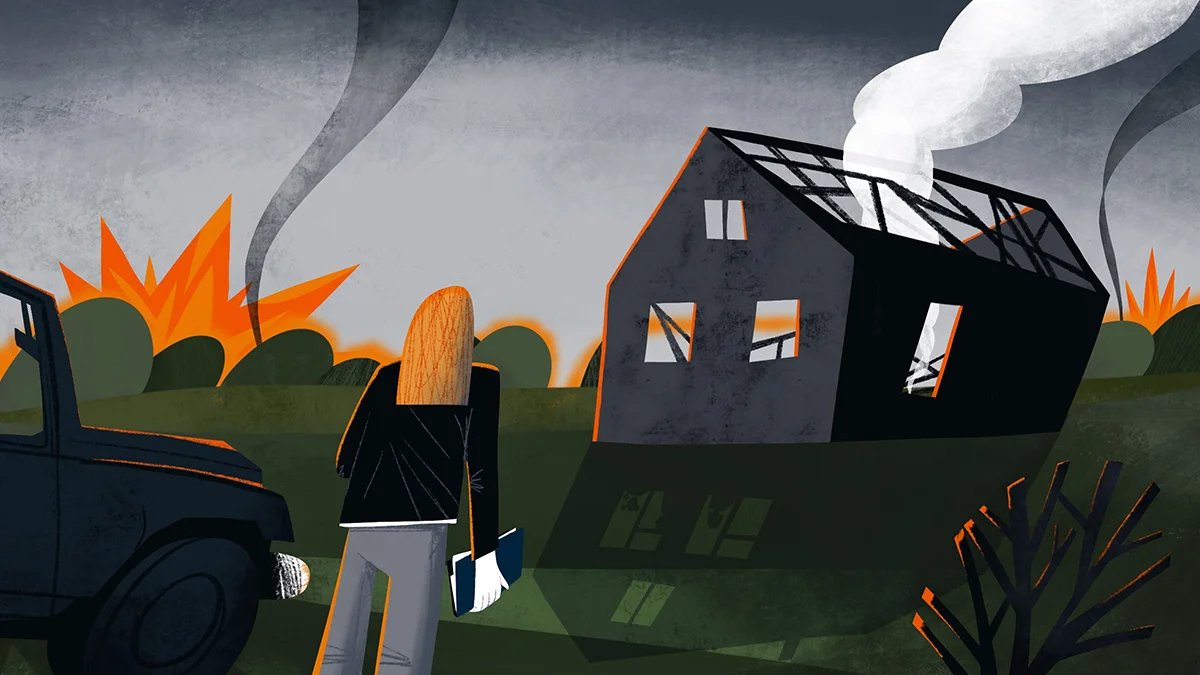
Illustration: Nastya Pokotinska / Novaya Gazeta Europe
The Six-Day War
At the height of the flood last summer, Lida received a request from the relatives of a woman who had stage-four cancer who was in unbearable pain. As no ambulance would drive to the village at the time, Lida and Mikhail decided to help evacuate her.
“We got her to a hospital in Crimea, where the nurses took pity on us. They took her in without paperwork or anything.” Soon enough, her daughter flew in to see her from Europe. She lived for another month. “People asked me why I’d risked my life if she died anyway, but she got to live another month without pain, and while being surrounded with her family.”
Lida and Mikhail evacuated people from a number of towns, including Oleshky and Hola Prystan. Most of those they evacuated either went to free Ukraine or travelled to Europe. “Old women send me greetings on WhatsApp for all the church holidays. At least I know when they are now,” Lida says with a laugh.
“As far as the locals [in the Kursk region] were concerned, the war had only been going on for six days.”
There was much debate in volunteer chat groups about whether to help people in Russia’s southwestern Kursk region when Ukrainian forces began their incursion there in August. While Lida says that she did go there, she didn’t stay for long, as pro-war volunteers made it very clear that she wasn’t welcome, but she noticed that there was much more aid available to the local population than there was in the Kherson region.
“I saw a journalist ask one man how long he’d been hiding from the shelling. He answered, ‘the entire war’, which surprised the journalist, who asked him: ‘what, over two years?’ And he said: ‘no, six days’. As far as the locals were concerned, the war had only been going on for that long. I found that hard to swallow, as I could remember Izyum and Mariupol. Now it’s happening in Kursk, but they hadn’t seen or heard anything before that.”
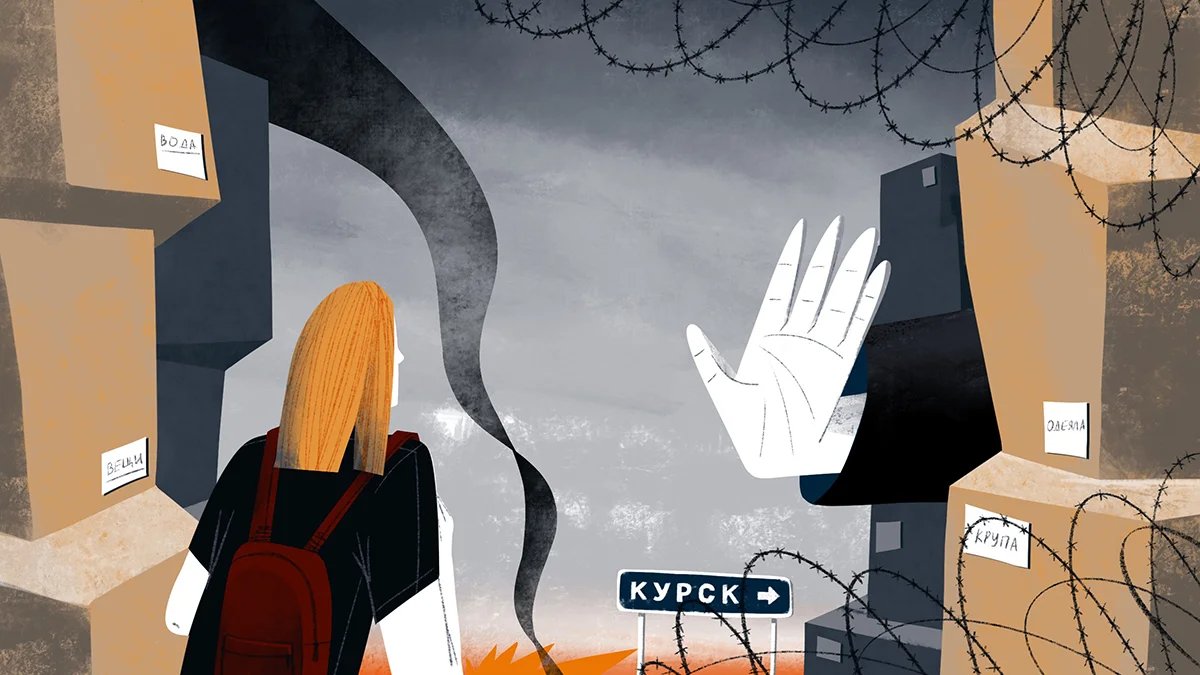
Illustration: Nastya Pokotinska / Novaya Gazeta Europe
Here and there
When asked how frightening she found it to be in a combat zone, Lida started by saying that she had accepted that she is different from most people when it comes to resilience.
On one occasion, though, the pent up emotion came pouring out suddenly and she found herself bursting into tears at the train station on her way back to Moscow. In her day-to-day life, she suffers almost no consequences from having been in a combat zone. Occasionally, the sound of a motorcycle, similar to that of flight of a drone, will wake her up. And when she enters a building, she automatically looks for where she can take shelter.
“It’s really scary when you’re transporting eight people, driving along a dangerous section of road. And you understand the responsibility.”
“What’s frightening is when someone tells me something terrible that’s happened to them or their children. It’s really scary when you’re transporting eight people, driving along a dangerous section of road. And you understand the responsibility.”
Despite the risk and injuries, Lida still answers requests for help. Her mother knew nothing of the trips to start with, but after Lida suffered her first concussion, her mother asked her to stop and threatened to confiscate her documents if she didn’t. Lida recently married and her husband doesn’t like her travelling to the front line either.
“They let me go after putting up resistance,” Lida admits. “But they know that if I don’t help, if I disengage, I feel really bad. They’re heroes for letting me go. I’d go crazy. But I’m more careful now than I was to start with. I was very selfish back then.”
Mikhail, who saw military action himself many years ago, taught Lida how to provide first aid, what to do during an attack, and how to recognise untrustworthy people.
When asked if she was an adrenaline junkie, Lida replies, “I don’t have to be in danger to help people. … All the trips we’ve made have been justified.”
Lida quit her job as a TV and theatre director when the war began and has only taken occasional projects on since then. “I didn’t have the wherewithal to go back to shooting ads after the really difficult evacuations,” she says.
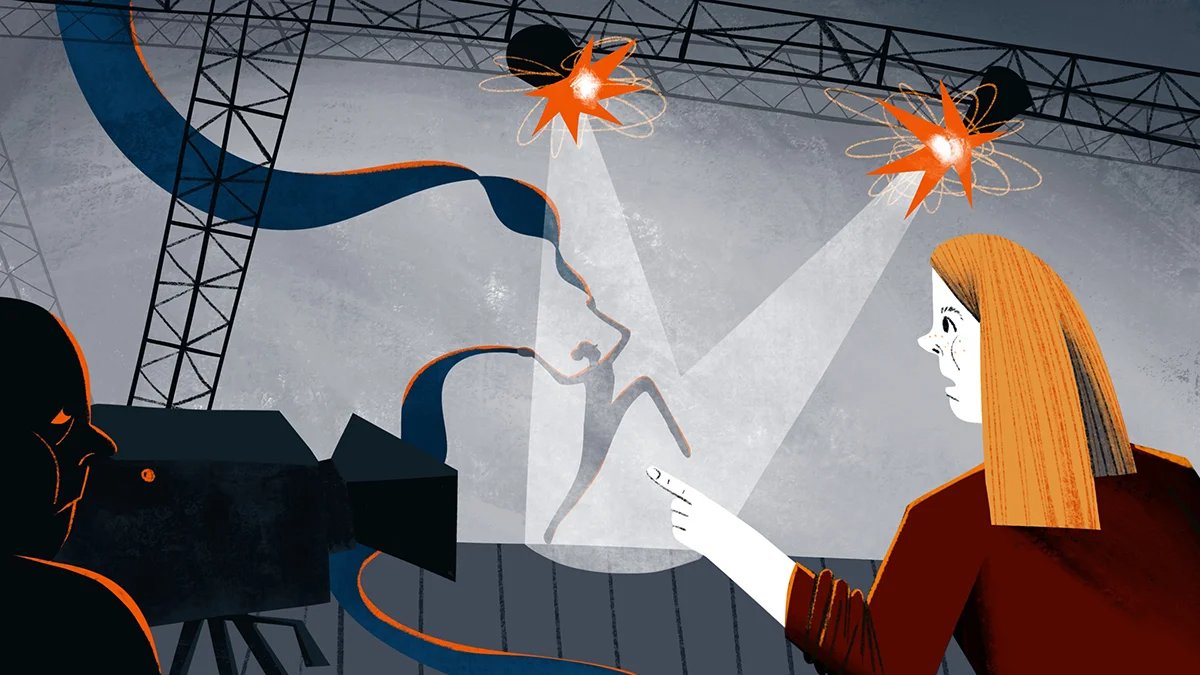
Illustration: Nastya Pokotinska / Novaya Gazeta Europe
“I’m a first assistant director, and I’m a 1.5-metre-tall woman, so I don’t get taken seriously to start with. It always takes a huge mental effort to establish my authority. And it’s always seemed a little pointless.”
In order not to sit idly by between trips and provide for herself financially, however, Lida got a job on the assembly line for a delivery service. The working hours are flexible and allow Lida to continue her evacuation work, which sometimes requires her to be in the occupied territories for months at a time, before then returning to work 15-hour shifts at the warehouse in Moscow.
There are now fewer people in need of evacuation, and Lida recently felt she was in a position to return to directing, both at the theatre and on set. That said, Lida has no intention of stopping and is ready to return to the combat zone to save civilians when the time comes.
* Not his real name
Join us in rebuilding Novaya Gazeta Europe
The Russian government has banned independent media. We were forced to leave our country in order to keep doing our job, telling our readers about what is going on Russia, Ukraine and Europe.
We will continue fighting against warfare and dictatorship. We believe that freedom of speech is the most efficient antidote against tyranny. Support us financially to help us fight for peace and freedom.
By clicking the Support button, you agree to the processing of your personal data.
To cancel a regular donation, please write to [email protected]
